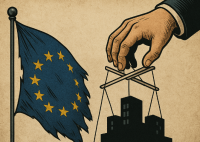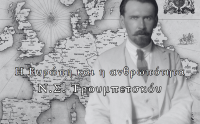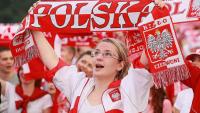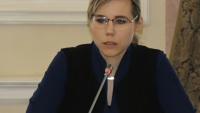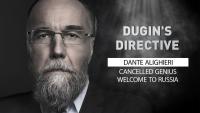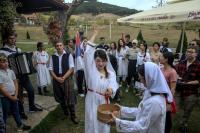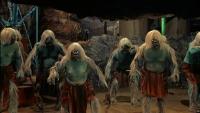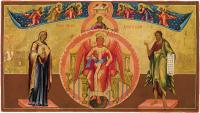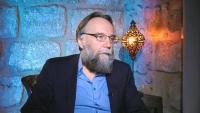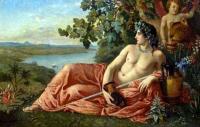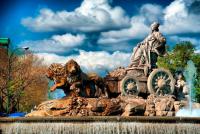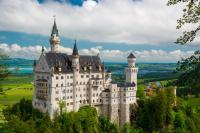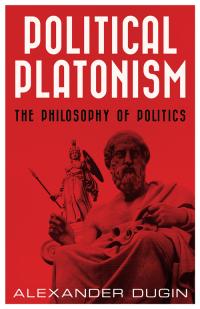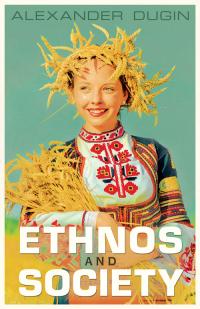Europe
Vote for AfD!
Jean-Marie Le Pen vs the Republic of the Devil
The Satanic Olympics
Η Ευρώπη και η ανθρωπότητα
Φέρνω το παρόν έργο στην προσοχή του κοινού όχι χωρίς κάποια ανησυχία. Οι ιδέες που εκφράζονται σε αυτό πήραν μορφή στο μυαλό μου πριν από δέκα και πλέον χρόνια. Από τότε τις έχω συζητήσει συχνά με διάφορους ανθρώπους, επιθυμώντας είτε να επαληθεύσω τις δικές μου απόψεις είτε να πείσω άλλους. Πολλές από αυτές τις συζητήσεις και αντιπαραθέσεις ήταν αρκετά χρήσιμες για μένα, διότι με ανάγκασαν να επανεξετάσω τις ιδέες και τα επιχειρήματά μου με μεγαλύτερη λεπτομέρεια και να τους δώσω πρόσθετο βάθος. Όμως οι βασικές μου θέσεις παρέμειναν αμετάβλητες.
The Polish Question. Partition of Ukraine?
27.05.2022 - Some background on Poland: the plan to hand over western Ukraine to Poland already existed before the start of the SMO, when the West was only considering the likelihood of such a conflict. NATO believed that Russia would destroy the command centre in Kiev at the beginning of the operation and that this would be a wake-up call for Poland; the relocation of the embassies from Kiev to Lviv was also linked to this.
How events in Ukraine have shaken the French political life: A FAN interview with Daria Platonova
Cancelled Dante
25 of May is Dante's birthday. But in the West, they don't celebrate it anymore.
Today it is simply dangerous. How so, you ask? Dante is the symbol of Western poetry, the world-famous classic. Yes, that's right. But even this Italian medieval genius was not spared by the guillotine of political correctness.
When the Divine Comedy fell into the hands of rabid human rights advocates, liberals and globalists, they discovered that Dante's work was politically incorrect. And that was it. No Dante anymore. He has become yet another victim of the liberal culture cleansing. His works can now only be printed with excerpts and disclaimer of “non politically correct content inside”.
Order and Chaos: the pillars of sacred geography
Order and Chaos are fundamental structures and constitute a pivotal nexus of reality as a whole. These concepts can thus be understood as consistent poles of the basic dynamic that characterizes and produces life, movement and relation themselves: without the connection between Order (the fixed, constant коород, that ensures the ontological and epistemic stability of the Unus Mundus) and Chaos (the pre-formal energetic dimension from which everything derives and toward which everything comes back, in a dynamic, dialectical and polemological process)[1] nothing could be properly understood — and even before that, nothing could appear in the domain of visibility, in the reign of the “clearing”, the Lichtung, to adopt Heideggerian language (Di Somma, 2017; Chai, 2014). As can be seen, Order and Chaos have a significant religious, symbolic and metaphysical core, which originally connotes these concepts through their cosmogonical and theological origin which is later acquired, discussed and embodied within philosophical speculation.
In Search of the White Logos
When Daedalus after tragic ordeals at last found firm ground in Cumae, he built Apollo a temple. He hung up his wings as an offering to the god and decorated the golden doors of the temple with his personal story. Aeneas would later reach these doors, and his contemplation of this story served as preparation for his own encounter with Apollo and the founding of Rome. For Apollonian wisdom to be revealed in all its lucidity, it is necessary first to come to terms with the story leading to his temple. Plato needs a Timaeus before the Parmenides, Hegel a Phenomenology of Spirit before the Science of Logic. The major, eternal mysteries need the minor, temporal mysteries, as Apollo needs Dionysus.
THE RISE OF THE TRADITIONALISTS: HOW A MYSTICAL DOCTRINE IS RESHAPING THE RIGHT
Steve Bannon, Donald Trump’s former chief strategist, returned to the headlines in August, having been arrested on a yacht and charged with defrauding donors to a private campaign to build a wall along the US-Mexico border. Of the $25m collected by the We Build the Wall organisation, Bannon and three partners are accused of diverting more than $1m for personal expenses. At a preliminary hearing, Bannon’s attorney entered a not guilty plea on his behalf. Bannon is often characterised as a “nationalist” and a “populist”, but few realise that he is also affiliated with a much more obscure movement – one stranger and more radical than right-wing populism, and one whose cause is greater than that of a single election, greater, in fact, than politics.
The End of Empire and 5 kings
When Bush was in Moscow, at the moment of the invasion of the United States in Iraq, he said: ‘Please be patient, you will have democracy as well, like in Iraq.’ Putin said: ‘Thank you very much, we will find another way to build our society.’
I think the picture you gave is correct, but it has nothing to do with modern Western society, where there is a purely totalitarian way of describing the facts, not in favour of a small group of owners of one mass medium or another, but in favour of a political elite. And they are in that sense a kind of Platonists, taking their truths from their liberal ideology; that is something Platonic as well. And the people are in revolt against that, in different countries but also in the West. I think the wave of populism is precisely the refusal of the European people, not right wing or left wing, but a refusal by normal European citizens of this absolutely abstract agenda of liberal elites. So I think that it is not about the State now, we are speaking about political elites.
Introduction to Noomakhia (lecture 9) – Serbian Logos
Let us concentrate on the Serbian Logos. First of all, it is sure and certain there is such thing as Serbian Dasein or Serbian existential horizon. That is absolutely sure because there is the Serbian people. And having Serbian people, that means that there is such thing as Serbian Dasein and Serbian existential horizon. As long as I know, there is no one who has dedicated to describe fully Serbian Dasein with Heideggerian categories, but it is up to some level, the technical task. If we understand what we have said about noology, about Dasein, about existential horizon, and knowing being and time of Heidegger, we could apply his categories (he called that existentials) special categories to describe Dasein. And it is technical task to apply that to Serbian Dasein.
Introduction to Noomakhia (lecture 8) Modernity
So we consider the modernity not as the fate 'cause we have it now and we will have it tomorrow, and we are obliged to be modern’ and so on. Traditionalists affirm that to be modern is a decision. You can be modern or you can be not modern. And they have created two concepts - the tradition and the modernity. So modernity is not something actual. That is a kind of society or civilization or world vision or picture of the reality. That is one thing. And there is tradition. That is the picture of reality, the civilization, the culture, and the society that is different. And between them, affirmed the traditionalists, there is antagonism. That is very important because that gives us the possibility to study modernity not as something inevitable but as something that is the product of concrete historical development based on concrete sequence of decisions and choices.
Introduction to Noomakhia (lecture 7) Christian Logos
The early Protestants, and above all, the German mystics (Meister Eckhart, Heinrich Seuse, and at a lesser scale Albertus Magnus) affirmed that there should be inner relation between the heart of the man with the Christ. It should not pass through exterior relations. For us there is no problem because in Orthodox tradition we recognize both. We recognize completely the authority of the Church and completely this direct relationship because we have the other concept of the Church. For us, the problem could not exist because we could not understand that. In our situation, there is no split. There are both. We have both ways - inner and outer. But for Western Christian tradition, there was a problem. And the first pre-Protestant mystics said ‘good, let us accept the outer exterior form but let us proceed in an inner way.’ And they were Platonic because they said that we have the direct relations with God and God could speak inside of us and that is our inner dimension. So they were purely Christian. In our situation they were closer to Orthodox in some ways. There were excesses, as well, of Platonism. For example, Meister Eckhart said that there is something beyond the Trinity, unity beyond the Trinity. That is not too much Orthodox. But nevertheless the main idea was so. This radical subject concept, the concept of the inner self that is living in the heart, and the ‘inner Christ’ as they called it was at the origin of Protestantism (in Wycliffe, Hussites, Czechs, German mystics). So that was legitimate up to some point.
Introduction to Noomakhia (lecture 6) Christian Logos
We were very close to it in the Dusan the Strong in your history, with the first and the second Bulgarian Kingdoms in the history of Bulgarians, we were close some time in the Polish Kingdom with Lithuanian and Great Moravia as well with some philosophical tendency. But we have never achieved the final version of this Logos in Eastern Europe, as well in Russia. We didn’t achieve the final version of Logos. Our existential horizon is not finished. It hasn’t received the last form. And that maybe is our historical challenge. And Slavophile thinkers saw that we came to the history later than the other when there was already a huge building of German philosophy, German political history, French philosophy, Roman philosophy, Greek philosophy, and as well political history. We Slavs have arrived to this a little later, not in the history, but to the understanding of history, to Logos of history, and to our philosophy. Our philosophy is a little bit childish and infantile. There is great example, great explosion of intellectual richness of precious thinkers such as Petar II Petrović-Njegoš metaphysical as well, Russian Dostoyevsky but all that is a kind of feeling of coming of our Logos and not the Logos itself. We are living in the anticipation of the Slav Logos. And when we study the past, we see many heroic deeds but we could not say that is our Logos. No. That is something like that. There is Saint Sava in Serbia. That’s anticipation of the Serbian mission, of the history. The creation of Nemanja Dynasty, Russian Ivan the Terrible and the other moments in our Slavic history are anticipation of Logos and not the Logos itself. That’s my personal opinion and it’s more difficult to describe our own Logos than to study the Logos of the other because it demands very deep introspection inside in our culture.
Introduciton to Noomakhia (lecture 5) Logos of Dionysos
I have already mentioned Edmund Husserl and his concept of intentionality. According to Husserl, intentional act is the act directed towards something that exists outside of our mind but that has no quality in it. So any quality that we are dealing with is inside of mind. Husserl calls that noema. The process of intentional act is noesis and noema is something that is thought of. So we are dealing with the qualities of the objects that are inherent to our process of thought and not exterior to it. So that is phenomenology. Heidegger is a continuation to this phenomenological tradition as are many others. But Gilbert Durand proposes a different way to this phenomenological approach and he speaks about the regimes of imagination. That is very important. Gilbert Durand affirms that our imagination works in three regimes. And that is very very close to the concept of three logos. Now we are going to see how. Regime of imagination is a kind of inner state of the structure of human mind that creates different sequences of basic principle images, symbols and structure. According to Gilbert Durand, there are three regimes. First is diurne, which is the regime of day. That is the regime of light that is based on the concept of strict duality. So there are strict and absolute differences. So when we divide and separate (regime of diurne is to separate, not unite, only separate) everything is clear as in the daylight. And this regime as well is a regime of vertical organization of the space. It is linked, according to Durand, with the postural reflexes of the child. When the child begins to stay in vertical position, it is considered by imagination as a flight. He is a kind of arrow that is going to the heaven. That is the flight.
Introduction to Noomakhia (lecture 4). Logos of Cybele
n our European civilization, we have two existential horizons and two daseins. One is the Logos of Apollo represented by the official ideology, three functional ideology, and the other is the Logos of Cybele. That is very important in the shadow part, in our subconscious, in the mother tradition. It is a part of the second parallel, hidden, or secret ideology. It is not the void. It is an ideology that is present in our societies but is not obvious, is not explicit. It is an implicit Logos of Cybele but is still alive because we are living in the civilization with the huge part of agriculture system and economy because we continue to produce and to consume the agriculture and food and we are sedentary. This level which we could individuate put the concept of the Logos of Cybele, not to the ancient types, but the Logos of Cybele exists now inside of ourselves, because our society is partly based precisely on this moment of noomahia. But noomahia is a continuing process. We could not once and forever grant the victory of one logos. If the Logos of Apollo weakens, that means that some other pole will become stronger. If the patriarchy dissolves (which is the case now in modernity), the other counter-current begins to appear, becomes more and more explicit, not implicit. That is the most important result of this noological analysis.
The New Program of Philosophy
Today the West is imposing not its system, but its systemlessness, not its obviousness, but its doubt, not its assertion, but its deep internal crisis. When we join the global network, we do not receive a new identity and we do not come into contact with a new world. We simply irrevocably surrender to the storage room with a forgotten entry code those remnants of what made us who we were before and that reality in which we lived before. The act of dropping old certitudes and definitions is quite specific: it is a passport to the “new times”, a credit card for complicity in globalism, a mandatory requirement, and all those who reject this “initiation into globalism” automatically end up on blacklists, henceforth deemed agents of the “axis of evil” – after all, they did not catch the “latest news” that the world and the human are dead (following the death of God).
THE LOGOS OF EUROPE: CATASTROPHE AND THE HORIZONS OF ANOTHER BEGINNING
The classic expression of this order was the ancient epoch of Mediterranean societies beginning with the Achaean conquests and Homeric Greece. Such a system was characteristic of Ancient Greece and Rome with the exception of periods of decline distinguished by a strengthening of the political positions of “urban dwellers”, who represented a mixture of higher castes with uprooted peasants that gave birth to a new type of merchant hitherto alien to classical Indo-European societies. This type of merchant could have taken shape through the degradation and materialization of the warrior caste (which Plato describes in his Republic as the phenomenon of timocracy), or from below through a specific deviation from social type on the part of former peasants or urban artisans. It cannot be ruled out that this was the result of influences that were altogether foreign to the Indo-European cultural circle, such as Phoenician or, more broadly, Semitic cultures, for whom trade was a widespread social occupation. In the city-states of Greece, “urban dwellers” and “citizens”, i.e., “townspeople”, formed a specific social milieu in which the three classical functions of Indo-European society found parodical manifestation. In the very least, this is what Aristotle presented in his Politics. The authority of king-priests (the sacred monarchy) transformed into tyranny. The domination of the warrior aristocracy gave way to domination by a financial oligarchy. The organic self-government of ethnically homogeneous and solidary communities (polity) became “democracy”, or the power of the sporadic and disparate crowd unified only by territory of urban residence.
Towards A New Resistance: Eurasian Postcolonialism – Identity, Difference And The Question Of Self
The whole discourse of post-colonial criticism lies within the unequal and uneven depiction of culture, in contrast to political and social authority within the liberal world order. Hence, the emergence of post-colonial discourse as a domain knowledge explored the marginalization of subaltern identities and became a historical testimony of the marginalized “Third world” with a broader focus on minorities within the geopolitical division of East and West. Moreover, the whole context of post-colonial revolves around the ideological state apparatus by digging out the differences between culture, social gap and political discrimination within the rationalization of Liberal modernity.
Today, there is a heated continental debate between the Liberal Atlanticists and Eurasianists, the latter of whom reject the liberal led modernity of Europe. Moreover, the Eurasianist traces their racial and cultural identity from the Indo-European Chronology and calls themselves as indo-Europeans instead of Liberal modern Europeans – which despite the civic, legalistic criteria of the latter, is in fact a cultural, historical, economic supremacism over the broader Eurasian identity rooted in its people.
The Deconstruction of Democracy
Democracy today cannot be discussed objectively. It is not a neutral concept: behind “democracy,” as a political regime and corresponding value system, stands the West, Europe and the USA. For them “democracy” is a form of secular cult or a tool of political dogmatics, thus, to be fully accepted into society in the West, it is necessary by default to be “for” democracy. One who calls it into question falls out of the field of political correctness. Marginal opposition is tolerated; but if it is more than marginal, democracy sets its machines of oppression against its alternatives like any regime, any ideology, and any dominant religion. It is not possible to talk about “democracy” impartially. That is why in discussions about democracy we must say at once whether we are completely for or completely against it. I’ll respond with extreme candor: I’m against it, but I’m against it only because the West is for it. I’m not prepared to accept anything thoughtlessly and uncritically on faith, even if everyone believes it, and all the more so if this is accompanied by a concealed (or clear) threat. You suggest that I rely on my own reason, no? I’ll begin with the fact that reason advises me to reject all suggestions [predlozheniy, offers, proposals]. No one can give us freedom. It either is or it is not [we either have it or we don’t]. A slave will convert even freedom into slavery, or at least into swinishness, and a free person will never be a slave even in fetters. From his time enslaved Plato did not become either less Plato or less free, while we still pronounce the name of the tyrant Dionysus with contempt, so which of them is a slave? At any rate, as a popular textbook on technical analysis says, “the majority is always wrong.”
Political Platonism
Alexander Dugin’s Political Platonism offers a seminal analysis of the contemporary philosophical crisis from one of the best-known writers and political commentators in post-Soviet Russia. Through a series of essays, course transcripts, and a single long interview—each remarkable for the depth of its learning and the boldness of its vision—Dugin exposes the profoundest roots of the Western philosophical tradition, offering his view of why it has reached its final terminus, and his indication of where a new beginning must be sought.
The works collected in this volume present Dugin’s theory of Political Platonism as a fundamental philosophical and political orientation, capable at once of reviving higher political and social forms and furnishing solid ground for resistance to the collapse of the contemporary world. His multi-perspective thesis offers a thorough and thought-provoking critique of modernity and a masterful survey of Western philosophy, reaching from before Heraclitus to beyond Heidegger. In its provocative, clear-sighted analyses and its visionary flights, this book provides an invaluable reference for those already familiar with Dugin, and an intriguing introduction for those coming to him for the first time.
THE ANATOMY OF POPULISM AND THE CHALLENGE OF THE MATRIX
First of all, the fact that populist movements are directed against the political elite as a whole, without making a distinction, whether it is right or left-wing, is striking. This is the 'uprise of the periphery of society against its center'. In his famous work, the American sociologist Christopher Lasch (1932–1994) designated the form of government that prevails in modern Western society as the “elite revolution”.
At the beginning of the XXth century, it was customary to follow José Ortega y Gasset's discourse about the “revolt of the masses”, whose increasing influence on politics threatened, it seemed, to destroy Western culture - the European Logos.
But Christopher Lasch noted a new political trend: it is the elites that are destroying culture and European Logos today. These new western elites, who have reached the pinnacle of power only by their resourcefulness and immense will to power, are much worse and more destructive than the masses.
ETHNOS AND SOCIETY: REVIEW
Where right-wing liberals and conservatives preach “you can’t do anything against the progression of modernity, it’s only possible to gradually influence the process”, Alexander Dugins Ethnos and Society tells you the exact opposite: When one realizes the fact, that there are still ethnic societies around this planet in the Amazon, that the Muslim communities of the Middle East still live in the community of their narod, that in Russia and India the modern nation state is just a thin layer, then it’s obvious that the decay of modernity is just a possibility and not our destiny. If we want to continue the suicide of Europe and follow modernity to its conclusion and change nothing. But if we want to restore our tradition and ensure the existence of our people, we have to radically change our habits, morals and our way of life.
Whereas The Fourth Political Theory tells us to return to pre-modernity in order to protect our Dasein (narod), Ethnos and Society shows us how the preconditions for a return to pre-modernity work. Therefore, Ethnos and Society, is not only important to better understand the work of professor Dugin, but also in order to fight post-modernity to the last blood. If one doesn’t let oneself be scared off by the theoretical depth of this book, it’ll greatly improve one’s understanding of the current processes of globalization, decadence and the Great Replacement. This book is exactly what all the right-wing populist parties in Europe would need in order to change their policies of fake populism and realize what is really necessary to revive European identity.

